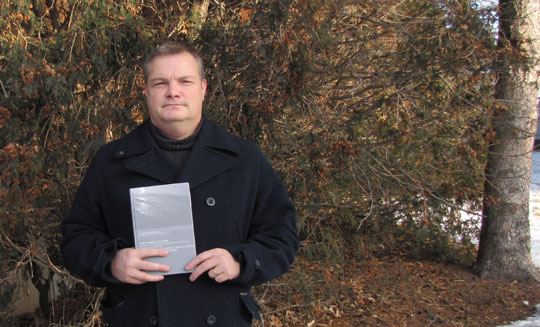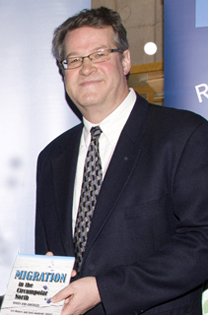(September 2, 2011 – Thunder Bay, ON) Dr. Chris Southcott, professor of sociology at Lakehead University, has been awarded a Leaders Opportunity Fund grant valued at $87,246 by the Canada Foundation for Innovation (CFI). This funding will offset research infrastructure costs to establish a new research network focused on investigating sustainable communities, cultures, and environments in the Circumpolar North.
Southcott's research project will conduct and mobilize research aimed at the sustainable development of Arctic natural resources in a manner that will improve the health and well-being of Canada's northern communities while focusing on the preservation of the region's unique environment.
"The Arctic remains one of Canada's last storehouses of natural resources," says Southcott. "For many Canadians, the Arctic represents opportunity and potential wealth. For those living there, however, the Arctic is home and is viewed and experienced quite differently."
Southcott's project plans include establishing regional social science laboratories at Lakehead University, as well as in the Yukon, the Northwest Territories, Nunavut, Northern Quebec, and Labrador. Support from Lakehead's Centre for Northern Studies was also valuable in enabling this infrastructure project to become a reality.
"The potential exists for finding new ways to develop resources and build capacity in northern communities," says Southcott. "This infrastructure is essential to position Canada as a world leader in research that shows how natural resources can be developed in a manner that can promote both local sustainability and environmental protection."
"Dr. Southcott's work in the Arctic is a stellar example of how Lakehead University contributes to solving real-world issues that impact populations all around the world," says Lakehead University President Brian Stevenson.
This new CFI funding is related to Southcott's overall project: in February 2011, Southcott and his research team were awarded $2.5 million by the Social Sciences and Humanities Research Council of Canada's (SSHRC) Major Collaborative Research Initiatives (MCRI) program. Contributions from all sources well exceed $6 million.
Dr. Rui Wang, vice-president (research, economic development, and innovation), is extremely pleased with CFI's funding announcement. "Continued infrastructural support for Lakehead's research projects is a necessity for sustaining our research and innovation stride. This new CFI funding is testament to Lakehead's growing reputation as a highly regarded research-intensive institution. The impact of Dr. Southcott's research will not only benefit communities in the Canadian north, but also affect communities throughout the northern hemisphere."
"CFI investments provide vital infrastructure in communities across the country and create opportunities for leveraging the work being undertaken by our enterprising researchers," says Dr. Gilles G. Patry, CFI president and CEO. "Cutting-edge research facilities are magnets that attract the best talent from around the world, allowing them to work with business and train a new generation of Canadian researchers and innovators."
Yesterday, the CFI held a press conference in Winnipeg, Manitoba to announce its national funding. The CFI announced a total of $53,298,531 in new funds to support 207 projects at 42 institutions across Canada. The investment was approved by the CFI Board of Directors following a rigorous merit-review process.
For a complete list of the projects awarded, please visit www.innovation.ca.
- 30 -
Media: Drs. Wang and Southcott are available for interview. To arrange interview times, please contact Janine Chiasson, communications officer, at 807-343-8177 or commun@lakeheadu.ca; or Frances Harding, acting director of communications, at 807-343-8193 orfharding@lakeheadu.ca.
About Lakehead
Lakehead is a comprehensive university with a reputation for a multidisciplinary teaching approach that emphasizes collaborative learning and independent critical thinking. Over 8,280 students and 2,000 faculty and staff learn and work at campuses located in Orillia, and Thunder Bay, Ontario, which is home to the west campus of the Northern Ontario School of Medicine. Lakehead University promotes innovative research that supports local and regional socio-economic needs. In Orillia, development continues on building a campus that meets Leadership in Energy and Environmental Design (LEED®) standards.
About the Canada Foundation for Innovation (CFI)
Created by the Government of Canada in 1997, the Canada Foundation for Innovation (CFI) strives to build our nations capacity to undertake world-class research and technology development to benefit Canadians through investments in state-of-the-art facilities and equipment in universities, colleges, research hospitals, and non-profit research institutions.



